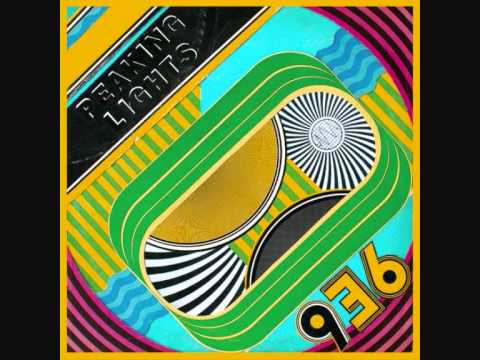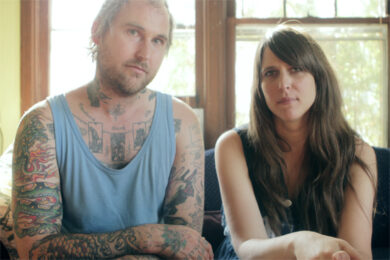If it’s possible to speak of an ‘orthodox’ sound emerging in Britt and Amanda Brown’s 7-year-old LA label, Not Not Fun, then Wisconsin’s Peaking Lights and their second LP, 936, tick many of the boxes. As with Amanda’s previous releases under the moniker LA Vampires, Peaking Lights are also similarly indebted to the expansive, heavily processed dub of Lee ‘Scratch’ Perry. Elsewhere, 936 also displays signs of an obsession with proto forms of dance music, spaced out kosmische musik, and psychedelia – the very stock and trade of their label mates Ital, Maria Minerva and Sun Araw. And certain techniques within Peaking Lights’ oeuvre are becoming idiosyncratic to NNF’s ‘sound’ itself, including a label-wide passion for analogue recording, and use of wordless vocal expression, which was first heard in the hippyish chanting of Pocahaunted, formed by Amanda Brown and Beth Cosentino.
These convergences don’t cease at aesthetics – they’re present on conceptual and spiritual levels too. As Simon Reynolds noted in an interview with Amanda for Wire in May 2011, part of the inspiration for Pocahaunted derived from, “a course on ritual and primitive religion that Cosentino took at Pasadena City Community College.” It therefore comes as little surprise that during this interview, Peaking Lights – Aaron Coyes and Indra Dunis – reveal that the title, 936, is a cryptic reference to their shared interest in spiritualism and mysticism. Track titles such as ‘Summertime’, ‘Birds of Paradise’, ‘Hey Sparrow’, and ‘Tiger Eyes’ further explore that Jungian mystical reverence for nature, as does the album’s overall warm, lush pastoral texture.
With all this taken into account, there couldn’t have been a better initial home for the band’s second long player than Not Not Fun. Released on a small run of 2000 in March 2011, 936 has since become one of the label’s best selling records, earning it a rerelease via Domino subsidiary Weird World. As such, NNF’s homespun DIY principles have created a home for Peaking Lights that staunchly emphasises the importance of the physical document over the instant accessibility of the MP3. In this respect, the new age West Coast spiritualism that surrounds the label, through bands such as Peaking Lights, is symbolically defiant of the inherent disposability of the MP3 and the digital age.
With that in mind, though, the question remains as to how bands and labels such as Peaking Lights and NNF reconcile these beliefs amid a culture that continues to shift further from their own preferred mode of operation. Speaking to an exceptionally fatigued looking Coyes and Dunis via Skype – lacking in sleep thanks to very recently having a baby – the couple did their best to explain more.
Hey guys. How did you meet? The rumour is that you were playing in goth bands in San Fransisco.
Aaron Coyes: I was playing in a goth band a long time ago, around 2000. What we were playing was a lot closer to Bauhaus and Siouxie & The Banshees style of gothic music than Marilyn Manson, that’s for sure.
Indra Dunis: We played together for a while in a band called Rah Dunes, which was psychedelic, electronic and a bit like Throbbing Gristle; that was just before we started Peaking Lights. Prior to that, I was drumming in a band called Numbers from the early 2000s until 2007. I’m actually originally from Wisconsin, but I moved to the Bay area in San Fransico, lived there for 10 years, and moved back to Wisconsin with Aaron a couple of years ago. We’re actually en route to move back to Bay area, howeve,r and we should be there by January!
So is 936 your second record as Peaking Lights?
AC: Fourth record, second album… Is that right?
ID: Um, maybe. We have trouble being able to tell which record was an album or an EP. The very first release was a tape called Clairvoyant. Then we did Imaginary Falcons, which I wouldn’t consider a full length. And then we also did some other bits, so it’s difficult to tell what was what. For example, ‘Birds of Paradise’ on 936 was originally released on a split with Wet Hair. When we first recorded it we just used a little cassette player, so the album version is totally different.
Were these sorts of early experiments in lo-fi aesthetics a matter of expression or economic necessity?
AC: Both. Knowing that we didn’t have money forced us into that position. When we recorded 936 we did it in 3 days, and it cost $200, and that was in a studio which changed our perception of what was possible for us to do and how we approached writing.
ID: When we were making the early records, the idea was that we could just do it ourselves with tape machines at home because it sounds really good and it has a really great quality to it, too. But it’s also really great to be able to go to a good studio and have access to both analogue and digital.
How do you feel about this view that modern lo-fi aesthetics signify a kind forlorn post-modern nostalgia, when crude experimentation has always been fundamental to dub?
AC: Well, there’s always this bullshit about nostalgia, but it’s not bullshit to want to experiment and that’s always been there, whether that’s Lee ‘Scratch’ Perry or Alvin Lucier or anyone else that’s played with the medium of recording. And I think that’s what it comes down to.
What about the title 936 – is it arbitrary or does it have another meaning?
AC: Well, yeah, it is arbitrary, but it also refers to the fact that 9 plus 3 is 12, and 1 plus 2 is 3, etc. There’s a whole thing with 9, and triangular numbers, and square numbers. It’s…just… a thing, I guess!
ID: We’re into numerology.
Are you being facetious?
AC: No, we’re being very sincere!
ID: We really are!
Are you specifically into numerology?
ID: We’re into our own brand of mysticism. We take elements from a lot of different mystical paths and make it our own. We’re both into numerology and astrology, and we’ve both been exposed to different kinds of spiritualism. My mother was really into Eastern philosophy when I was growing up, so instead of going to church I went to a meditation group once a month. When I met Aaron, it seemed like he was quite into magick.
So are the references to nature on 936 concerned with your own spirituality?
AC: I think it’s more just that I grew up in the woods in the country and have a big respect for nature. So does Indra.
ID: I get a lot of inspiration from nature.
AC: I try to lock into a natural harmony rather than one that’s formed by people who think that they are man gods or something. It’s more about subconscious love, and things you actually feel as opposed to things where you actually think things through.
How do you reconcile these mystical beliefs with being in a band in 2011 whereby you unavoidably exist within the scientific framework of Web 2.0 culture?
AC: I don’t know if the Web is necessarily force for rationality, as computers and the Internet are totally feminising our culture. By making us sit in front of screens, computers are making us passive, and we’re moving away from having to be super-aggressive. In other ways the Internet is also causing information to move super quickly, and in that sense, it is magic. My Grandma just saw our son via a Skype conversation and it just blew her mind.
Do you see yourselves as a psychedelic band?
ID: I would definitely see us as a psychedelic band, yeah, but we’re into a lot of different stuff.
AC: It’s about synthesizing a range of different influences, yes.
So is Peaking Lights a renaissance project?
AC: I think it’s partially a renaissance project, and partially doing something new. We’re definitely looking in the rear-view mirror of time as we drive forward. We listen to a lot of old music. I do a lot of crate digging, and collect house and soul records and all kinds of other stuff like Latin and boogaloo.
ID: Reggae music is very hard to play anyway, so I think that what we do is our own interpretation.
AC: We tried not to get pigeon holed, because we want it to be something of our own. It’s always going to be about experiment. I can’t see us ever getting lost in one style.
So what can we expect next time – a tribute to your Bauhaus days?
Indra: That’s a secret! But, well, we’re recording it right now and hopefully it’ll be out by next May.




